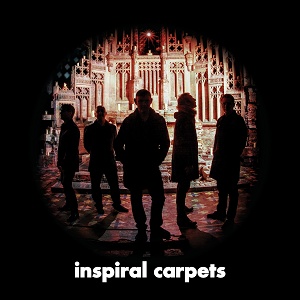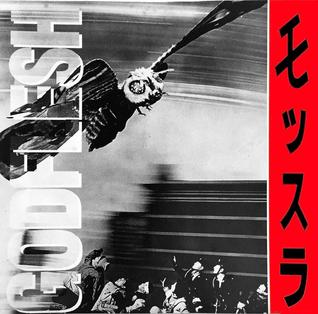
Out of Step is the only studio album by American hardcore punk band Minor Threat. It was released on 45 RPM vinyl in April 1983 through Dischord Records. Although Out of Step has only been released on CD in limited quantities, it has been repressed on vinyl as recently as 2010. All tracks from the album are available on Minor Threat's 1989 compilation album Complete Discography.

Rites of Spring was an American punk rock band from Washington, D.C., formed in late 1983. Along with Embrace, and Beefeater, they were one of the mainstay acts of the 1985 Revolution Summer movement which took place within the Washington, D.C. hardcore punk scene.

Embrace is the debut record and the only release by the American post-hardcore band Embrace.

Neurosis is an American post-metal band from Oakland, California. It was formed in 1985 by guitarist Scott Kelly, bassist Dave Edwardson, and drummer Jason Roeder, initially as a hardcore punk band. Chad Salter joined as a second guitarist and appeared on the band's 1987 debut Pain of Mind and then Steve Von Till replaced him in 1989. The following year, the lineup further expanded to include a keyboardist and a visual artist. Beginning with their third album Souls at Zero (1992), Neurosis transformed their hardcore sound by incorporating diverse influences including doom metal and industrial music, becoming a major force in the emergence of the post-metal and sludge metal genres.
Post-hardcore is a punk rock music genre that maintains the aggression and intensity of hardcore punk but emphasizes a greater degree of creative expression. Like the term "post-punk", the term "post-hardcore" has been applied to a broad constellation of groups. Initially taking inspiration from post-punk and noise rock, post-hardcore began in the 1980s with bands like Hüsker Dü and Minutemen. The genre expanded in the 1980s and 1990s with releases by bands from cities that had established hardcore scenes, such as Fugazi from Washington, D.C. as well as groups such as Big Black, Jawbox, Quicksand, and Shellac that stuck closer to post-hardcore's noise rock roots. Dischord Records became a major nexus of post-hardcore during this period.

Washington, D.C., hardcore, commonly referred to as D.C. hardcore, sometimes styled in writing as harDCore, is the hardcore punk scene of Washington, D.C. Emerging in late 1979, it is considered one of the first and most influential punk scenes in the United States.
Hoover was an American post-hardcore band from Washington, D.C. Formed in 1992, Hoover went on to produce some of the more intense music to appear on the Dischord Records label in the 1990s. Compared to Fugazi, Hoover was more experimental and permissive, incorporating elements of jazz and dub, and not limiting themselves to an aggressive stance. Unusually, three of the four members shared vocal duties equally.

Slavestate is the second EP by English industrial metal band Godflesh. It was released in July 1991 through Earache Records. The EP saw the band experimenting with more samples and electronic sounds than their predominantly industrial metal prior releases.

Pure is the second studio album by English industrial metal band Godflesh. It was released on 13 April 1992 through Earache Records. Though originally labeled only as industrial metal, the album has since been recognised as one of the earliest post-metal releases. Musically, Pure is rhythmically mechanical and features harsh guitars, with protracted songs and an abundance of deliberate repetition. Like much of Godflesh's music, it is regarded as particularly heavy and aggressive, and these elements helped it gain critical acclaim.

Can I Say is the debut album by the American melodic hardcore band Dag Nasty, originally released in 1986 on Dischord Records. It was remastered and re-released on CD with bonus songs in 2002. "Circles" appeared on a best-of emo songs list by Vulture.

Wig Out At Denko's is the second studio album by the American melodic hardcore band Dag Nasty, released in 1987 on Dischord Records.

Hello Bastards is the second full-length album by the punk rock band Lifetime. It was recorded at Trax East Studio in New Jersey, USA, during May and June 1995 and was released by Jade Tree Records on September 25, 1995. On February 20, 2010, No Idea Records re-released the album on 12" color vinyl.

Souls at Zero is the third studio album by the American post-metal band Neurosis. It was released in 1992 by the Alternative Tentacles record label. It was reissued in 1999 with bonus tracks on the band's own Neurot Recordings label. On February 15, 2010, the album was reissued on CD and digitally with new artwork by Neurot. Souls at Zero marked a shift in the band's style, moving away from the fast-paced hardcore punk influences of their early work towards slower tempos and greater experimentation.
Fuel was a short-lived Bay Area post-hardcore musical act that created both personal and political songs, something that was unique during the "first wave" of emo in the 1990s. Fuel had a sound akin to the mostly East Coast bands on Dischord Records, especially Fugazi, with twin guitars and dueling rough post-hardcore vocals. In fact, it is noted that Fuel was often jokingly referred to as "Fuelgazi." Fuel's style resembled the D.C. sound of many Dischord bands.
"Bitchin' Camaro" is a song by American rock band the Dead Milkmen, released on their debut album Big Lizard in My Backyard (1985). The song was written by vocalist Rodney Linderman, guitarist and vocalist Joseph Genaro, bassist Dave Schulthise, and drummer Dean Sabatino. The track contains an extended, rambling intro of two characters having a conversation, after which the song shifts into a hardcore punk song about the bitchin' Chevrolet Camaro.

Cold World is the third EP by English industrial metal band Godflesh, released in late 1991 through Relativity Records. It was recorded and mixed during September 1991 as part of the Pure (1992) sessions.
The High Back Chairs was a band from Washington, DC. Initially consisting of guitarist/vocalist Peter Hayes, guitarist Jim Spellman, bassist/vocalist Charles Steck, and drummer/vocalist Jeff Nelson, the group released its music on the Washington, D.C. punk record label, Dischord Records. The band eschewed the post-hardcore and hardcore punk sounds that Dischord was known for. Instead, the High-Back Chairs' music was highly melodic indie rock, owing more to power pop and jangle pop than to the band's punk rock roots. This was all the more notable since Nelson was a co-founder of Dischord and had played in the influential hardcore punk band, Minor Threat from 1980 to 1983. "Coming out at a time when grunge held a lot of sway in Amerindie land," Trouser Press later said of the band, "this breezy, supremely melodic, gutsy rock seemed almost noble."

Inspiral Carpets is the fifth studio album by the British indie rock band of the same name, released on 20 October 2014. The album is their first in 20 years; and the first full-length album in the band's history to feature founding vocalist Stephen Holt, who replaced Tom Hingley following Hingley's departure from the band. It is also the band's final album with drummer Craig Gill, before his death in 2016.

All the Dread Magnificence of Perversity is the fourth full-length studio album by Gnaw Their Tongues, released on May 10, 2009 by Burning World and Crucial Blast.

"Mothra" is a song by English industrial metal band Godflesh. It was taken from their 1992 album Pure and saw release as a radio promo and music video in the same year. The track's title is derived from 1961 Japanese film of the same name by Ishirō Honda. Musically, "Mothra" is a grinding, mechanical song with shouted vocals and heavily distorted instruments.














